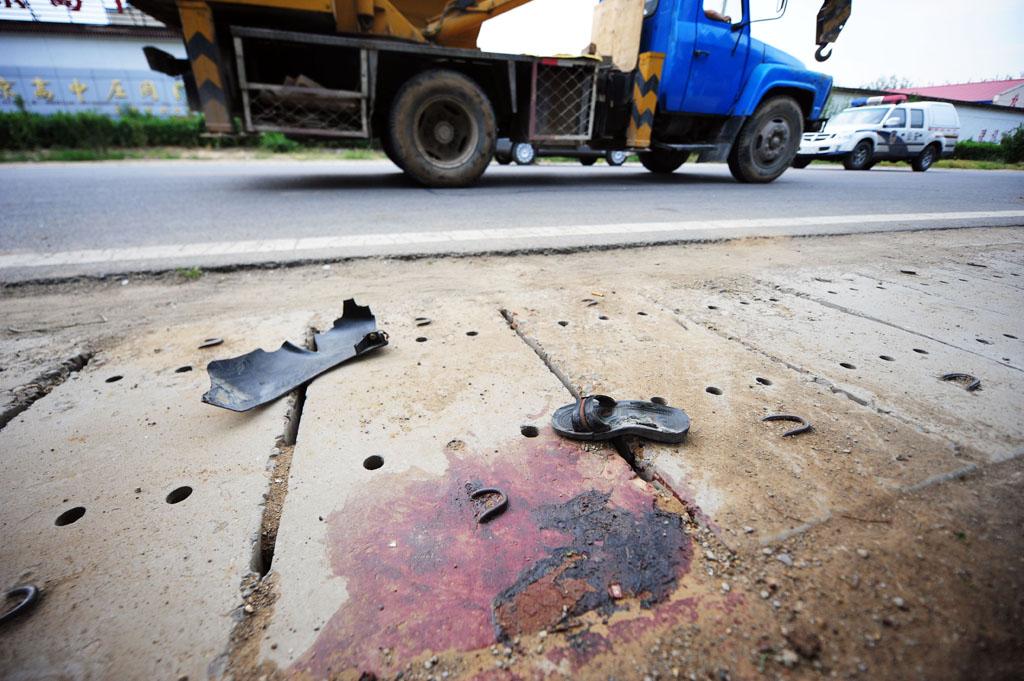GlobalPost’s top 5 most shocking stories of 2011
China’s roads are among the world’s most dangerous, with traffic laws and safety widely flouted, as almost 70,000 people died in road accidents in 2009, or around 190 fatalities a day, according to police statistics.
Shock·ing (shkng) adj.
1. Highly disturbing emotionally.
2. Highly offensive; indecent or distasteful.
3. Very vivid or intense in tone: shocking pink.
True to the dictionary definition, GlobalPost's Top 5 Most Shocking Stories of 2011 offers intense takes on unexpected stories.
1) China: The economics of killing someone by Kathleen E. McLaughlin in Beijing
A person accidentally hits someone on the road. It happens everyday. The driver speeds off. Sadly, that too happens everyday. What doesn't happen everyday, however, is the driver returning to the scene of the crime to run over the person again, making sure to kill him or her this time. Why would they do such a thing? It's simply cost-effective. When a person is dead, they're dead. When they're alive and injured, there is always the potential that an unpaid medical bill might come knocking on your door.
And what's worse? It's trend in China. In the past two-and-a-half years, Chinese media have reported around a dozen hit-and-run cases where the driver is believed to have intentionally killed someone or knowingly let them die after first accidentally running them down.
Video shows van hitting a toddler and then bystanders walking by the child.
2) Three Mile Island expert: Fukushima could kill 200,000 by David Case
When the tsunami hit Fukushima Dai-ichi nuclear power plant back in March, it was clear there had been a horrible disaster. What was less clear was the precise extent of that disaster. The Japanese government had a vested interest in downplaying the horrors and attempting to maintain calm, while veterans of the nuclear establishment were less assured.
One such expert, Arnold Gundersen, who worked as a nuclear plant operator for many years and served as an expert witness on the Three Mile Island accident, gave GlobalPost an exclusive interview that raised eyebrows in Japan and sent shivers down the spines of many the world over. Among his claims:
I absolutely disagree with the scientists who say that Fukushima’s not going to hurt anyone. The numbers I’ve seen, from reputable scientists, are that Fukushima is going to kill 200,000 from increased cancers over the next 50 years.
And just this past weekend, the results of an investigation into Japan's disaster response appear to side with Gundersen. The upshot: Authorities made multiple mistakes, including assuming that an emergency cooling system was working and delaying the disclosure of dangerous radiation leaks to the public.
3) Inside Bangladesh's organ bazaar by Sebastian Strangio in Joypurhat
Bangladesh has long been considered a shining example of microfinance gone right. After all, it is the birthplace of Nobel Prize winner Muhammad Yunus' Grameen Bank. But among the success stories of poor villagers getting a leg up with the help of a low-interest loan, there is a darker narrative. Some Bangladeshis, unable to pay back their loans, resort to selling their internal organs in exchange for cash, only to be short-changed by brokers or burdened with chronic health problems, according to police officials and residents.
4) Libya: Where are the 50,000 missing prisoners by Tracey Shelton in Tripoli
The grisly discovery of around 50 charred bodies in a secret detention facility run by the notorious Brigade 32, an elite unit run by Col. Muammar Gaddafi’s son Khamis, fuelled fears that there could be thousands more prisoners who met the same fate in Libya.
And let's not forget Gaddafi's final moments, which proved to be particularly shocking when they were revealed to include an alleged act of sodomy.
5) Gulnaz: Afghanistan rape victim may be forced to marry her attacker by Jean MacKenzie in Kabul
Gulnaz, a young Afghan woman, was imprisoned for “moral crimes” after she was raped by her cousin’s husband. She was released from prison on Dec. 14 by order of the president, and then went into hiding from her own family. While she is now relatively safe, her life is now limited to a series of unpalatable choices. She can agree to marry her rapist, or be forever on the run. According to several sources close to the case, her brothers have threatened to kill her baby daughter, the product of the rape.
Every day, reporters and producers at The World are hard at work bringing you human-centered news from across the globe. But we can’t do it without you. We need your support to ensure we can continue this work for another year.
Make a gift today, and you’ll help us unlock a matching gift of $67,000!
